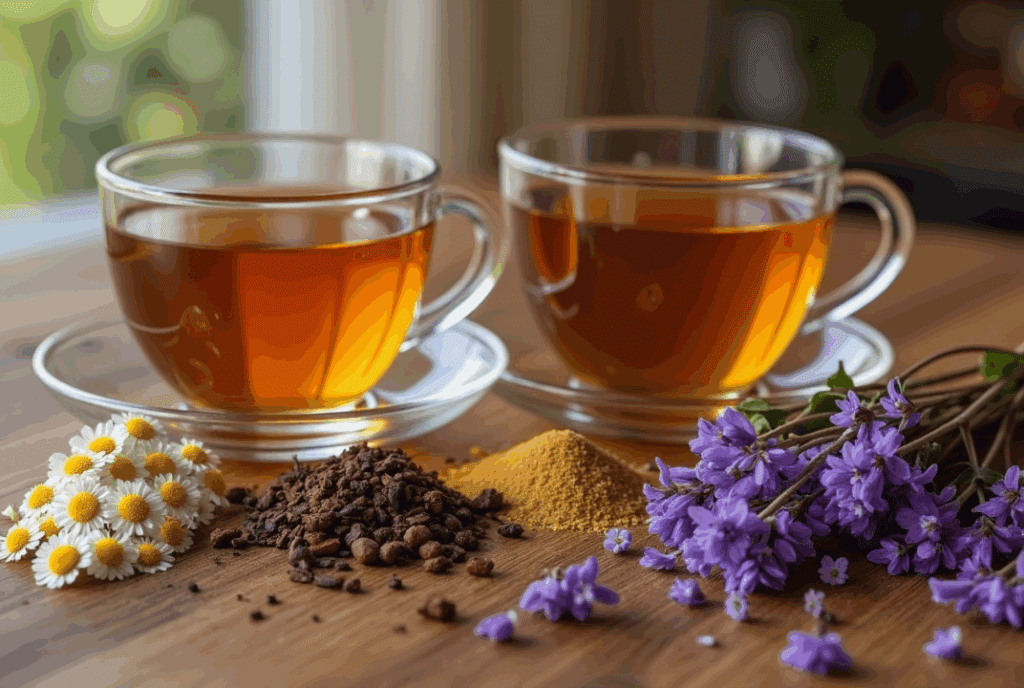As we explore the world of herbal remedies for sleep, we find ourselves drawn to natural solutions that may help us achieve deeper, more restful nights. With herbs like chamomile and valerian root gaining popularity, it’s worth considering how these options could fit into our nightly routines. The benefits could be significant, but we should also understand how they work and if they’re the right choice for us. Let’s uncover what these herbal allies can offer.
Why Herbal Remedies Are Used for Deep Sleep
When we struggle to get a good night’s sleep, many of us turn to herbal remedies as a natural solution. We’ve all heard about the herbal benefits that various plants can offer, and it’s fascinating how these remedies align with sleep science. Studies show that certain herbs can promote relaxation and reduce anxiety, making it easier to drift off.
Popular Herbs That Support Deep Sleep
Many of us seek out popular herbs that can enhance our sleep quality. With so many options available, it’s helpful to know which ones stand out. Here are four herbs that we can easily incorporate into our nightly routines:
- Chamomile tea – This gentle herb is renowned for its calming effects, making it a go-to for many seeking a restful night.
- Valerian root – Often used as a natural sedative, valerian root helps to reduce the time it takes to fall asleep while improving overall sleep quality.
- Lavender – Known for its soothing aroma, lavender can promote relaxation, making it easier to drift off into slumber.
- Passionflower – This herb helps decrease anxiety and improve sleep quality, providing a natural way to unwind at the end of the day.
How Herbal Compounds Influence Sleep Cycles
While we often turn to herbal remedies for better sleep, it’s essential to understand how these compounds actually impact our sleep cycles. Many herbal compounds, like valerian root and chamomile, work by modulating neurotransmitters in the brain. This helps us relax, making it easier to transition into sleep.
These herbs can also influence the different stages of sleep, promoting deeper REM cycles, which are crucial for restorative rest. By enhancing our natural sleep architecture, they can lead to more refreshing nights.
Moreover, some herbal compounds may reduce the time it takes to fall asleep, allowing us to spend more time in those critical deep sleep stages. As we explore these natural options, we start to appreciate how they support not just the duration of sleep but also its quality, helping us feel more rejuvenated each morning.
Research Supporting Herbal Sleep Aids
Numerous studies highlight the effectiveness of herbal sleep aids, revealing their potential to improve sleep quality and duration. Clinical studies have shown that various herbs can enhance our sleep experience, and we’re excited to share some findings that underline their efficacy:
- Valerian Root: Research indicates it can reduce the time it takes to fall asleep and increase sleep quality.
- Chamomile: Known for its calming effects, studies suggest it may help improve sleep patterns, especially in those with insomnia.
- Lavender: Clinical studies have demonstrated that lavender aroma can significantly enhance sleep quality and promote relaxation.
- Passionflower: Evidence suggests this herb may reduce anxiety and improve sleep duration, making it a popular choice for those struggling with rest.
These findings inspire confidence in the herbal efficacy of these natural sleep aids, providing us with promising options for deeper, restful sleep.
Practical Tips for Using Herbal Sleep Remedies
To make the most of herbal sleep remedies, we should consider a few practical strategies that can enhance their effectiveness. First, let’s explore different herbal preparation methods. Whether we’re brewing a calming tea or using tinctures, the method can impact how our body absorbs the herbs. For example, steeping dried chamomile flowers for at least 10 minutes can help extract more beneficial compounds.
Next, we need to focus on sleep environment optimization. Creating a peaceful atmosphere can significantly improve our sleep quality. We can dim the lights, reduce noise, and maintain a comfortable temperature. Adding calming scents, like lavender, can further enhance relaxation.
Finally, let’s establish a bedtime routine that includes our chosen herbal remedy. Consistency is key, so taking our herbal sleep aid at the same time each night can help signal our body that it’s time to wind down. By combining these strategies, we can maximize the benefits of herbal sleep remedies.
How to Choose Between Different Herbal Options
How do we decide which herbal option is best for our sleep needs? To make an informed choice, we can follow these simple steps:
- Conduct a sleep quality assessment: Reflect on our sleep patterns, noting what disrupts our rest.
- Research herbal combination strategies: Some herbs work better together. For example, combining valerian root with chamomile may enhance effectiveness.
- Consult with a healthcare professional: It’s wise to discuss our options, especially if we’re taking medications or have health concerns.
- Start with one herb at a time: This allows us to gauge how each option affects our sleep before mixing them.
Are Herbal Sleep Remedies a Good Fit for You?
Have we ever wondered if herbal sleep remedies are the right choice for our sleep struggles? Exploring these natural options can be a game-changer, but we should consider a few factors. First, we need to assess our personal preferences—some may prefer a calming tea, while others might opt for capsules or tinctures.
Next, let’s not forget about herbal safety. It’s crucial to research any potential interactions with medications or existing health conditions. Consulting with a healthcare professional can provide us with tailored advice and peace of mind.
Ultimately, the effectiveness of herbal sleep remedies varies from person to person, so we might need to experiment a bit. If we find the right fit, these remedies can support our journey to deeper, more restful sleep. By prioritizing our safety and aligning with our preferences, we can make informed decisions that enhance our overall well-being.




